|
09.00 - 09.15
|
EMBO Global Activities
Anne-Marie Glynn, EMBO, DE
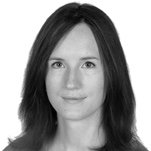 Anne-Marie Glynn is Manager of the EMBO Courses & Workshops Programme and Head of EMBO Global Activities, an initiative that started three years ago. Originally from Ireland, she holds a PhD in Molecular Biology jointly awarded by the European Molecular Biology Laboratory, Germany, and the University of Dundee, UK. In addition to promoting scientific and management training and dissemination of results, she is actively involved in establishing new links between researchers in Europe and beyond, particularly in Asia. Anne-Marie Glynn is Manager of the EMBO Courses & Workshops Programme and Head of EMBO Global Activities, an initiative that started three years ago. Originally from Ireland, she holds a PhD in Molecular Biology jointly awarded by the European Molecular Biology Laboratory, Germany, and the University of Dundee, UK. In addition to promoting scientific and management training and dissemination of results, she is actively involved in establishing new links between researchers in Europe and beyond, particularly in Asia.
|
|
Mechanisms of tumor suppression - Chair: Vincenzo Costanzo
|
|
09.15 - 09.35
|
Molecular mechanisms of cellular senescence
Fabrizio d'Adda di Fagagna, IFOM - IGM (CNR), IT
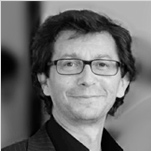 Fabrizio d'Adda di Fagagna obtained his PhD at the International School for Advanced Studies (ISAS-SISSA) in Trieste, Italy. He was then postdoc and Research Associate in Steve Jackson's group at the Gurdon Institute of the University of Cambridge, UK. He is now a tenured Principal Investigator at IFOM Foundation in Milan, Italy and a group leader at the Institute of Molecular Genetics (IGM) of the National Research Council in Pavia, Italy. In 2012 he was nominated an EMBO member. Fabrizio d'Adda di Fagagna obtained his PhD at the International School for Advanced Studies (ISAS-SISSA) in Trieste, Italy. He was then postdoc and Research Associate in Steve Jackson's group at the Gurdon Institute of the University of Cambridge, UK. He is now a tenured Principal Investigator at IFOM Foundation in Milan, Italy and a group leader at the Institute of Molecular Genetics (IGM) of the National Research Council in Pavia, Italy. In 2012 he was nominated an EMBO member.
|
|
09.35 - 09.55
|
Genetics of B-cell malignancies
Stefano Casola, IFOM, IT
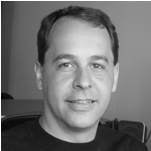 Stefano Casola is a group leader at IFOM, Milan, Italy. He obtained his Medical Degree in 1993 and PhD degree in 1999 from the University of Naples Federico II, Naples, Italy. Following his post-doctoral training at the Institute of Genetics, University of Cologne, Germany, he moved to Harvard Medical School where he became Instructor and Junior Investigator at the Center for Blood Research, under the mentorship of Klaus Rajewsky. Since 2006 he has led in IFOM a research unit focused on understanding the molecular mechanism of B-cell development and lymphomagenesis.
Stefano Casola is a recipient of the Giovanni Armenise/Harvard Career Development Award. Stefano Casola is a group leader at IFOM, Milan, Italy. He obtained his Medical Degree in 1993 and PhD degree in 1999 from the University of Naples Federico II, Naples, Italy. Following his post-doctoral training at the Institute of Genetics, University of Cologne, Germany, he moved to Harvard Medical School where he became Instructor and Junior Investigator at the Center for Blood Research, under the mentorship of Klaus Rajewsky. Since 2006 he has led in IFOM a research unit focused on understanding the molecular mechanism of B-cell development and lymphomagenesis.
Stefano Casola is a recipient of the Giovanni Armenise/Harvard Career Development Award.
|
|
09.55 - 10.15
|
Trafficking and signaling: Complementary characters in tumor suppression
Thomas Vaccari, IFOM, IT
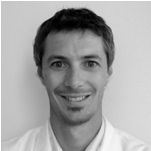 Thomas Vaccari obtained his B.Sc. in Biology at the University of Milan, Italy. He worked in Anne Ephrussi's group at the EMBL where he obtained is Ph.D. in 2003. He then joined the lab of David Bilder at the University of California, Berkeley, where he identified a novel class of tumor suppression genes in Drosophila. In 2009, he established his lab at the IFOM-IEO Campus in Milan, where he studies how endocytosis controls signaling and tumor suppression. Thomas Vaccari obtained his B.Sc. in Biology at the University of Milan, Italy. He worked in Anne Ephrussi's group at the EMBL where he obtained is Ph.D. in 2003. He then joined the lab of David Bilder at the University of California, Berkeley, where he identified a novel class of tumor suppression genes in Drosophila. In 2009, he established his lab at the IFOM-IEO Campus in Milan, where he studies how endocytosis controls signaling and tumor suppression.
|
|
10.20 - 10.40
|
Coffee break
|
^ top |
|
New frontiers in cancer therapy - Chair: Alberto Bardelli
|
|
10.50 - 11.20
|
Connecting the machineries of cell fate determination and tumor suppression in breast stem cells
Pier Paolo Di Fiore, IFOM - IEO - University of Milan, IT
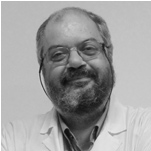 Pier Paolo Di Fiore was the first scientific director of IFOM and is the Director of the Molecular Medicine Programme at the European Institute of Oncology. His work focuses on the endocytic regulation of growth factor receptor signalling in cancer. He has also linked endocytosis to cancer by demonstrating that loss of expression of Numb, an endocytic protein and stem cell fate determinant, is causal in breast tumorigenesis. In recent years, his translational research lines have led him to identify a signature for metastatic risk in breast cancer, a predictor of survival for early-stage lung cancer and a stem cell signature that links the stem cell content of breast tumors to their molecular characteristics. Di Fiore's life's work is widely recognized, as witnessed by more than 200 published papers. Pier Paolo Di Fiore was the first scientific director of IFOM and is the Director of the Molecular Medicine Programme at the European Institute of Oncology. His work focuses on the endocytic regulation of growth factor receptor signalling in cancer. He has also linked endocytosis to cancer by demonstrating that loss of expression of Numb, an endocytic protein and stem cell fate determinant, is causal in breast tumorigenesis. In recent years, his translational research lines have led him to identify a signature for metastatic risk in breast cancer, a predictor of survival for early-stage lung cancer and a stem cell signature that links the stem cell content of breast tumors to their molecular characteristics. Di Fiore's life's work is widely recognized, as witnessed by more than 200 published papers.
|
|
11.20 - 11.40
|
Targeting DNA repair in chemotherapy
Chit Fang Cheok, IFOM-p53 Lab, SG
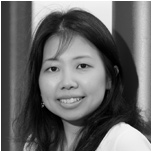 Chit Fang Cheok received her B.Sc (Hons) from Imperial College London and her DPhil degree from the University of Oxford. She was the recipient of the Singapore Economic Development Board-Glaxo Wellcome scholarship and the National Science Scholarship awarded by the Agency for Science Technology and Research (A*STAR) Singapore. While she was at the Molecular Oncology group in Cancer Research UK, Oxford, she studied the role of a causative mutation in the rare chromosomal instability disorder, Bloom's syndrome, in DNA repair. In 2006, she returned to Singapore and did her postdoctoral training at A*STAR, where she studied the role of p53 tumor suppressor protein in regulating tumor cell death and chemotherapeutic responses. In 2011, Chit Fang was appointed as the Principal Investigator of the IFOM-p53Lab Joint Research Laboratory. Her main research interest is in discovering novel therapeutic strategies targeting defects in tumor suppressor pathways and DNA repair pathways in tumors. Chit Fang Cheok received her B.Sc (Hons) from Imperial College London and her DPhil degree from the University of Oxford. She was the recipient of the Singapore Economic Development Board-Glaxo Wellcome scholarship and the National Science Scholarship awarded by the Agency for Science Technology and Research (A*STAR) Singapore. While she was at the Molecular Oncology group in Cancer Research UK, Oxford, she studied the role of a causative mutation in the rare chromosomal instability disorder, Bloom's syndrome, in DNA repair. In 2006, she returned to Singapore and did her postdoctoral training at A*STAR, where she studied the role of p53 tumor suppressor protein in regulating tumor cell death and chemotherapeutic responses. In 2011, Chit Fang was appointed as the Principal Investigator of the IFOM-p53Lab Joint Research Laboratory. Her main research interest is in discovering novel therapeutic strategies targeting defects in tumor suppressor pathways and DNA repair pathways in tumors.
|
|
11.40 - 12.00
|
Targeted therapies for colorectal cancer
Alberto Bardelli, IFOM - University of Turin-Medical School, IT
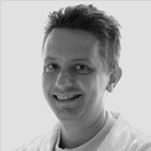 Alberto Bardelli is Director of the Laboratory of Molecular Genetics at Institute for Cancer Research @ Candiolo (IRCC) and Associate Professor at the Department of Oncological Sciences, University of Turin-Medical School. His work is centered on the molecular bases of targeted therapies in the field of personalized medicine. As a post doc at the Johns Hopkins University, Alberto Bardelli developed the first comprehensive mutational profile of kinases in CRCs. As an independent investigator he then translated these findings into clinical practice by discovering that K-RAS (B-RAF) mutations impart resistance to EGFR-targeted agents. These findings were later confirmed by independent laboratories with such compelling evidence that they were rapidly translated into clinically applicable predictive biomarkers (genomic signatures) currently used to select patients for anti EGFR therapy. Recently, Alberto Bardelli's work has defined an innovative methodology -named liquid biopsy- which allows the use of circulating tumor DNA to monitor patient response using a blood draw. A future focus of his lab is to define other resistance mechanisms in patients and find appropriately tailored drug combinations that target them. Alberto Bardelli is Director of the Laboratory of Molecular Genetics at Institute for Cancer Research @ Candiolo (IRCC) and Associate Professor at the Department of Oncological Sciences, University of Turin-Medical School. His work is centered on the molecular bases of targeted therapies in the field of personalized medicine. As a post doc at the Johns Hopkins University, Alberto Bardelli developed the first comprehensive mutational profile of kinases in CRCs. As an independent investigator he then translated these findings into clinical practice by discovering that K-RAS (B-RAF) mutations impart resistance to EGFR-targeted agents. These findings were later confirmed by independent laboratories with such compelling evidence that they were rapidly translated into clinically applicable predictive biomarkers (genomic signatures) currently used to select patients for anti EGFR therapy. Recently, Alberto Bardelli's work has defined an innovative methodology -named liquid biopsy- which allows the use of circulating tumor DNA to monitor patient response using a blood draw. A future focus of his lab is to define other resistance mechanisms in patients and find appropriately tailored drug combinations that target them.
|
|
13.00 - 14.00
|
Lunch
|
|
15.00 - 18.00
|
Poster Session
|
^ top |

 Anne-Marie Glynn is Manager of the EMBO Courses & Workshops Programme and Head of EMBO Global Activities, an initiative that started three years ago. Originally from Ireland, she holds a PhD in Molecular Biology jointly awarded by the European Molecular Biology Laboratory, Germany, and the University of Dundee, UK. In addition to promoting scientific and management training and dissemination of results, she is actively involved in establishing new links between researchers in Europe and beyond, particularly in Asia.
Anne-Marie Glynn is Manager of the EMBO Courses & Workshops Programme and Head of EMBO Global Activities, an initiative that started three years ago. Originally from Ireland, she holds a PhD in Molecular Biology jointly awarded by the European Molecular Biology Laboratory, Germany, and the University of Dundee, UK. In addition to promoting scientific and management training and dissemination of results, she is actively involved in establishing new links between researchers in Europe and beyond, particularly in Asia.
 Fabrizio d'Adda di Fagagna obtained his PhD at the International School for Advanced Studies (ISAS-SISSA) in Trieste, Italy. He was then postdoc and Research Associate in Steve Jackson's group at the Gurdon Institute of the University of Cambridge, UK. He is now a tenured Principal Investigator at IFOM Foundation in Milan, Italy and a group leader at the Institute of Molecular Genetics (IGM) of the National Research Council in Pavia, Italy. In 2012 he was nominated an EMBO member.
Fabrizio d'Adda di Fagagna obtained his PhD at the International School for Advanced Studies (ISAS-SISSA) in Trieste, Italy. He was then postdoc and Research Associate in Steve Jackson's group at the Gurdon Institute of the University of Cambridge, UK. He is now a tenured Principal Investigator at IFOM Foundation in Milan, Italy and a group leader at the Institute of Molecular Genetics (IGM) of the National Research Council in Pavia, Italy. In 2012 he was nominated an EMBO member. Stefano Casola is a group leader at IFOM, Milan, Italy. He obtained his Medical Degree in 1993 and PhD degree in 1999 from the University of Naples Federico II, Naples, Italy. Following his post-doctoral training at the Institute of Genetics, University of Cologne, Germany, he moved to Harvard Medical School where he became Instructor and Junior Investigator at the Center for Blood Research, under the mentorship of Klaus Rajewsky. Since 2006 he has led in IFOM a research unit focused on understanding the molecular mechanism of B-cell development and lymphomagenesis.
Stefano Casola is a recipient of the Giovanni Armenise/Harvard Career Development Award.
Stefano Casola is a group leader at IFOM, Milan, Italy. He obtained his Medical Degree in 1993 and PhD degree in 1999 from the University of Naples Federico II, Naples, Italy. Following his post-doctoral training at the Institute of Genetics, University of Cologne, Germany, he moved to Harvard Medical School where he became Instructor and Junior Investigator at the Center for Blood Research, under the mentorship of Klaus Rajewsky. Since 2006 he has led in IFOM a research unit focused on understanding the molecular mechanism of B-cell development and lymphomagenesis.
Stefano Casola is a recipient of the Giovanni Armenise/Harvard Career Development Award.
 Thomas Vaccari obtained his B.Sc. in Biology at the University of Milan, Italy. He worked in Anne Ephrussi's group at the EMBL where he obtained is Ph.D. in 2003. He then joined the lab of David Bilder at the University of California, Berkeley, where he identified a novel class of tumor suppression genes in Drosophila. In 2009, he established his lab at the IFOM-IEO Campus in Milan, where he studies how endocytosis controls signaling and tumor suppression.
Thomas Vaccari obtained his B.Sc. in Biology at the University of Milan, Italy. He worked in Anne Ephrussi's group at the EMBL where he obtained is Ph.D. in 2003. He then joined the lab of David Bilder at the University of California, Berkeley, where he identified a novel class of tumor suppression genes in Drosophila. In 2009, he established his lab at the IFOM-IEO Campus in Milan, where he studies how endocytosis controls signaling and tumor suppression. Pier Paolo Di Fiore was the first scientific director of IFOM and is the Director of the Molecular Medicine Programme at the European Institute of Oncology. His work focuses on the endocytic regulation of growth factor receptor signalling in cancer. He has also linked endocytosis to cancer by demonstrating that loss of expression of Numb, an endocytic protein and stem cell fate determinant, is causal in breast tumorigenesis. In recent years, his translational research lines have led him to identify a signature for metastatic risk in breast cancer, a predictor of survival for early-stage lung cancer and a stem cell signature that links the stem cell content of breast tumors to their molecular characteristics. Di Fiore's life's work is widely recognized, as witnessed by more than 200 published papers.
Pier Paolo Di Fiore was the first scientific director of IFOM and is the Director of the Molecular Medicine Programme at the European Institute of Oncology. His work focuses on the endocytic regulation of growth factor receptor signalling in cancer. He has also linked endocytosis to cancer by demonstrating that loss of expression of Numb, an endocytic protein and stem cell fate determinant, is causal in breast tumorigenesis. In recent years, his translational research lines have led him to identify a signature for metastatic risk in breast cancer, a predictor of survival for early-stage lung cancer and a stem cell signature that links the stem cell content of breast tumors to their molecular characteristics. Di Fiore's life's work is widely recognized, as witnessed by more than 200 published papers. Chit Fang Cheok received her B.Sc (Hons) from Imperial College London and her DPhil degree from the University of Oxford. She was the recipient of the Singapore Economic Development Board-Glaxo Wellcome scholarship and the National Science Scholarship awarded by the Agency for Science Technology and Research (A*STAR) Singapore. While she was at the Molecular Oncology group in Cancer Research UK, Oxford, she studied the role of a causative mutation in the rare chromosomal instability disorder, Bloom's syndrome, in DNA repair. In 2006, she returned to Singapore and did her postdoctoral training at A*STAR, where she studied the role of p53 tumor suppressor protein in regulating tumor cell death and chemotherapeutic responses. In 2011, Chit Fang was appointed as the Principal Investigator of the IFOM-p53Lab Joint Research Laboratory. Her main research interest is in discovering novel therapeutic strategies targeting defects in tumor suppressor pathways and DNA repair pathways in tumors.
Chit Fang Cheok received her B.Sc (Hons) from Imperial College London and her DPhil degree from the University of Oxford. She was the recipient of the Singapore Economic Development Board-Glaxo Wellcome scholarship and the National Science Scholarship awarded by the Agency for Science Technology and Research (A*STAR) Singapore. While she was at the Molecular Oncology group in Cancer Research UK, Oxford, she studied the role of a causative mutation in the rare chromosomal instability disorder, Bloom's syndrome, in DNA repair. In 2006, she returned to Singapore and did her postdoctoral training at A*STAR, where she studied the role of p53 tumor suppressor protein in regulating tumor cell death and chemotherapeutic responses. In 2011, Chit Fang was appointed as the Principal Investigator of the IFOM-p53Lab Joint Research Laboratory. Her main research interest is in discovering novel therapeutic strategies targeting defects in tumor suppressor pathways and DNA repair pathways in tumors.
 Alberto Bardelli is Director of the Laboratory of Molecular Genetics at Institute for Cancer Research @ Candiolo (IRCC) and Associate Professor at the Department of Oncological Sciences, University of Turin-Medical School. His work is centered on the molecular bases of targeted therapies in the field of personalized medicine. As a post doc at the Johns Hopkins University, Alberto Bardelli developed the first comprehensive mutational profile of kinases in CRCs. As an independent investigator he then translated these findings into clinical practice by discovering that K-RAS (B-RAF) mutations impart resistance to EGFR-targeted agents. These findings were later confirmed by independent laboratories with such compelling evidence that they were rapidly translated into clinically applicable predictive biomarkers (genomic signatures) currently used to select patients for anti EGFR therapy. Recently, Alberto Bardelli's work has defined an innovative methodology -named liquid biopsy- which allows the use of circulating tumor DNA to monitor patient response using a blood draw. A future focus of his lab is to define other resistance mechanisms in patients and find appropriately tailored drug combinations that target them.
Alberto Bardelli is Director of the Laboratory of Molecular Genetics at Institute for Cancer Research @ Candiolo (IRCC) and Associate Professor at the Department of Oncological Sciences, University of Turin-Medical School. His work is centered on the molecular bases of targeted therapies in the field of personalized medicine. As a post doc at the Johns Hopkins University, Alberto Bardelli developed the first comprehensive mutational profile of kinases in CRCs. As an independent investigator he then translated these findings into clinical practice by discovering that K-RAS (B-RAF) mutations impart resistance to EGFR-targeted agents. These findings were later confirmed by independent laboratories with such compelling evidence that they were rapidly translated into clinically applicable predictive biomarkers (genomic signatures) currently used to select patients for anti EGFR therapy. Recently, Alberto Bardelli's work has defined an innovative methodology -named liquid biopsy- which allows the use of circulating tumor DNA to monitor patient response using a blood draw. A future focus of his lab is to define other resistance mechanisms in patients and find appropriately tailored drug combinations that target them.
 Global COE Program
Global COE Program